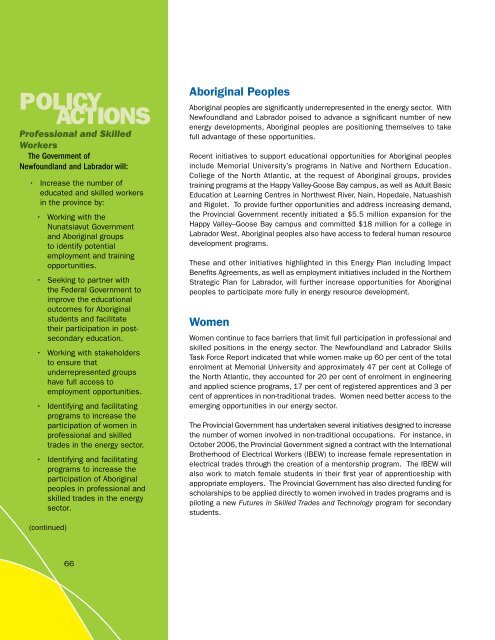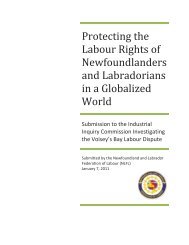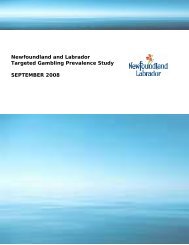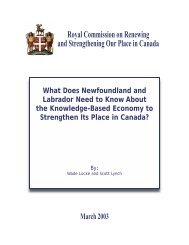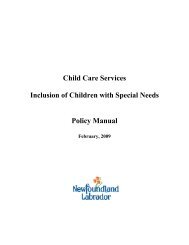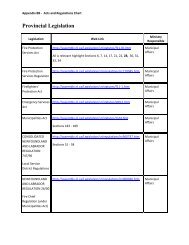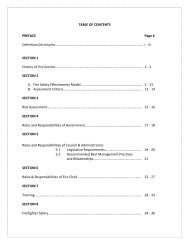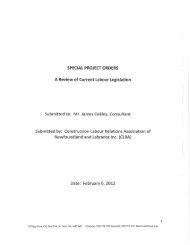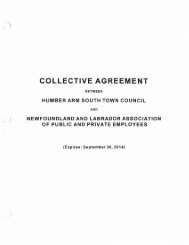Energy Plan - Government of Newfoundland and Labrador
Energy Plan - Government of Newfoundland and Labrador
Energy Plan - Government of Newfoundland and Labrador
Create successful ePaper yourself
Turn your PDF publications into a flip-book with our unique Google optimized e-Paper software.
POLICY<br />
ACTIONS<br />
Pr<strong>of</strong>essional <strong>and</strong> Skilled<br />
Workers<br />
The <strong>Government</strong> <strong>of</strong><br />
<strong>Newfoundl<strong>and</strong></strong> <strong>and</strong> <strong>Labrador</strong> will:<br />
• Increase the number <strong>of</strong><br />
educated <strong>and</strong> skilled workers<br />
in the province by:<br />
• Working with the<br />
Nunatsiavut <strong>Government</strong><br />
<strong>and</strong> Aboriginal groups<br />
to identify potential<br />
employment <strong>and</strong> training<br />
opportunities.<br />
• Seeking to partner with<br />
the Federal <strong>Government</strong> to<br />
improve the educational<br />
outcomes for Aboriginal<br />
students <strong>and</strong> facilitate<br />
their participation in postsecondary<br />
education.<br />
• Working with stakeholders<br />
to ensure that<br />
underrepresented groups<br />
have full access to<br />
employment opportunities.<br />
• Identifying <strong>and</strong> facilitating<br />
programs to increase the<br />
participation <strong>of</strong> women in<br />
pr<strong>of</strong>essional <strong>and</strong> skilled<br />
trades in the energy sector.<br />
• Identifying <strong>and</strong> facilitating<br />
programs to increase the<br />
participation <strong>of</strong> Aboriginal<br />
peoples in pr<strong>of</strong>essional <strong>and</strong><br />
skilled trades in the energy<br />
sector.<br />
Aboriginal Peoples<br />
Aboriginal peoples are significantly underrepresented in the energy sector. With<br />
<strong>Newfoundl<strong>and</strong></strong> <strong>and</strong> <strong>Labrador</strong> poised to advance a significant number <strong>of</strong> new<br />
energy developments, Aboriginal peoples are positioning themselves to take<br />
full advantage <strong>of</strong> these opportunities.<br />
Recent initiatives to support educational opportunities for Aboriginal peoples<br />
include Memorial University’s programs in Native <strong>and</strong> Northern Education.<br />
College <strong>of</strong> the North Atlantic, at the request <strong>of</strong> Aboriginal groups, provides<br />
training programs at the Happy Valley-Goose Bay campus, as well as Adult Basic<br />
Education at Learning Centres in Northwest River, Nain, Hopedale, Natuashish<br />
<strong>and</strong> Rigolet. To provide further opportunities <strong>and</strong> address increasing dem<strong>and</strong>,<br />
the Provincial <strong>Government</strong> recently initiated a $5.5 million expansion for the<br />
Happy Valley–Goose Bay campus <strong>and</strong> committed $18 million for a college in<br />
<strong>Labrador</strong> West. Aboriginal peoples also have access to federal human resource<br />
development programs.<br />
These <strong>and</strong> other initiatives highlighted in this <strong>Energy</strong> <strong>Plan</strong> including Impact<br />
Benefits Agreements, as well as employment initiatives included in the Northern<br />
Strategic <strong>Plan</strong> for <strong>Labrador</strong>, will further increase opportunities for Aboriginal<br />
peoples to participate more fully in energy resource development.<br />
Women<br />
Women continue to face barriers that limit full participation in pr<strong>of</strong>essional <strong>and</strong><br />
skilled positions in the energy sector. The <strong>Newfoundl<strong>and</strong></strong> <strong>and</strong> <strong>Labrador</strong> Skills<br />
Task Force Report indicated that while women make up 60 per cent <strong>of</strong> the total<br />
enrolment at Memorial University <strong>and</strong> approximately 47 per cent at College <strong>of</strong><br />
the North Atlantic, they accounted for 20 per cent <strong>of</strong> enrolment in engineering<br />
<strong>and</strong> applied science programs, 17 per cent <strong>of</strong> registered apprentices <strong>and</strong> 3 per<br />
cent <strong>of</strong> apprentices in non-traditional trades. Women need better access to the<br />
emerging opportunities in our energy sector.<br />
The Provincial <strong>Government</strong> has undertaken several initiatives designed to increase<br />
the number <strong>of</strong> women involved in non-traditional occupations. For instance, in<br />
October 2006, the Provincial <strong>Government</strong> signed a contract with the International<br />
Brotherhood <strong>of</strong> Electrical Workers (IBEW) to increase female representation in<br />
electrical trades through the creation <strong>of</strong> a mentorship program. The IBEW will<br />
also work to match female students in their first year <strong>of</strong> apprenticeship with<br />
appropriate employers. The Provincial <strong>Government</strong> has also directed funding for<br />
scholarships to be applied directly to women involved in trades programs <strong>and</strong> is<br />
piloting a new Futures in Skilled Trades <strong>and</strong> Technology program for secondary<br />
students.<br />
(continued)<br />
66


